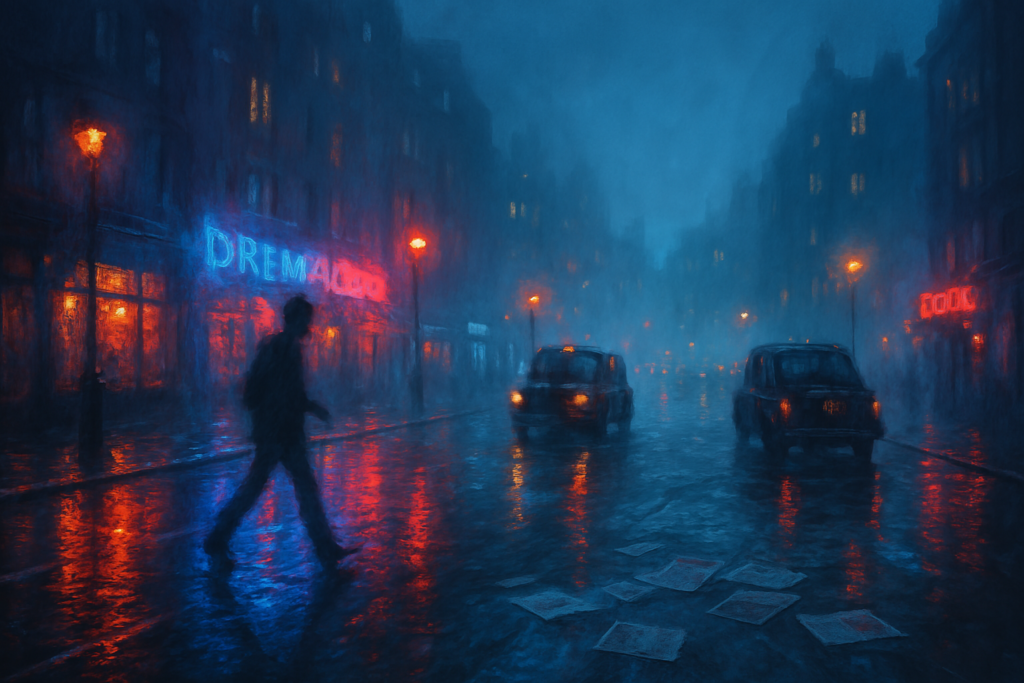The Imperial College campus buzzes with academic energy, but my mind frequently wanders beyond its modern glass structures to the city that surrounds it. London in winter holds a particular kind of magic—a dance between shadow and illumination, history and innovation, belonging and alienation. As I navigate my first months of the Strategic Marketing program, I find myself equally absorbed by the metropolis itself, this living organism that consumes and transforms all who enter it.
Yesterday, walking back from the library through Exhibition Road as evening descended, I was struck by how the Victorian architecture of the Natural History Museum stood in stark contrast to the sleek lines of newer buildings. Gothic spires reaching upward like petrified prayers while neon signs flickered in shop windows. This juxtaposition has inspired a poem I’ve been working on for several weeks. I call it simply “About London”:
About London
Night. I wander amidst drifting reflections,
Where neon on glass re-illuminates night;
The city seems sculpted from sweet confections,
From scraps of old papers, shop signs blazing bright.Across the damp asphalt they float in a gloom,
Black cabs in a funeral hush sweep the crowd;
This city was raised as a glittering tomb—
To lure and devour, to zero and shroud.Colossal, half-wild, and so foreign in splendor,
With courteous clamor each visage erased;
It tempts with euphoria, cunning yet tender,
Dissolving us all—my soft killer embraced.No soul will recall you by name in this place,
Your travels are dull to its wide, barren gaze;
Yet out of that hollow, indifferent space
A raw, vivid happiness lifts through the haze.You vanish—forever in freedom unbound,
Your dwelling is nowhere, yet everywhere found;
You smile at the passers, as lifeless around,
And merge with them all—one in silence profound.
In Russian:
О Лондоне
Ночь. Иду сквозь плывущие блики,
Неоном стекло отражает свой свет,
Будто бы город слеплён из мастики,
Реклам магазинов, обрывков газет.По асфальту сырому, лениво мчатся
Праздным трауром кэбы, народ собирать.
Этот город был в точности создан стараться
Отвлекать, забирать, обнулять и сжиратьВеликий, огромный, чужой, полудикий
Вежливым воплем стирающий лица,
И, совратив эйфорией на пике,
Всех растворяет, мой нежный убийцаВас никогда здесь не вспомнят по имени,
Городу скучен ваш пройденный путь.
Вот только, в подобном пустом изобилии
И есть натурального счастья вся суть.Ты исчез – но теперь став навеки свободным,
Твое место отныне – нигде и везде.
Улыбаясь таким же мертвым прохожим,
Ты становишься – частью их всех.
This paradoxical relationship with the city mirrors my current state at Imperial College. I’m immersed in marketing theories and business strategies by day, analyzing case studies and developing campaigns. Yet by night, I return to literature, to the exploration of human experience that can’t be quantified in spreadsheets or captured in pitch decks.
The college itself embodies this duality—classical columns at its entrance giving way to modernist interiors filled with technology. My fellow students speak the language of ROI and market penetration, but many harbor secret passions—music, painting, writing—that they pursue in stolen moments between assignments.
Perhaps this is London’s greatest gift: it accommodates contradictions. The city allows you to be multiple versions of yourself simultaneously, to exist between categories. A marketing student and a poet. An analyst and a dreamer. A temporary resident and a keen observer.
As T.S. Eliot—another transplant who found his literary voice in these streets—wrote: “I will show you fear in a handful of dust.” London shows me possibility in a handful of contrasts, in the spaces between defined identities.
The semester grows more demanding, but I find that my creative output has not diminished—rather, it’s transformed, becoming more focused, more attuned to the tensions and harmonies of urban existence. There’s something about navigating this ancient-modern metropolis that sharpens perception, that makes even mundane moments feel charged with significance.
“A city is not gauged by its length and width, but by the broadness of its vision and the height of its dreams.” (I think of this quote, variously attributed, as I watch London’s skyline from Primrose Hill)
